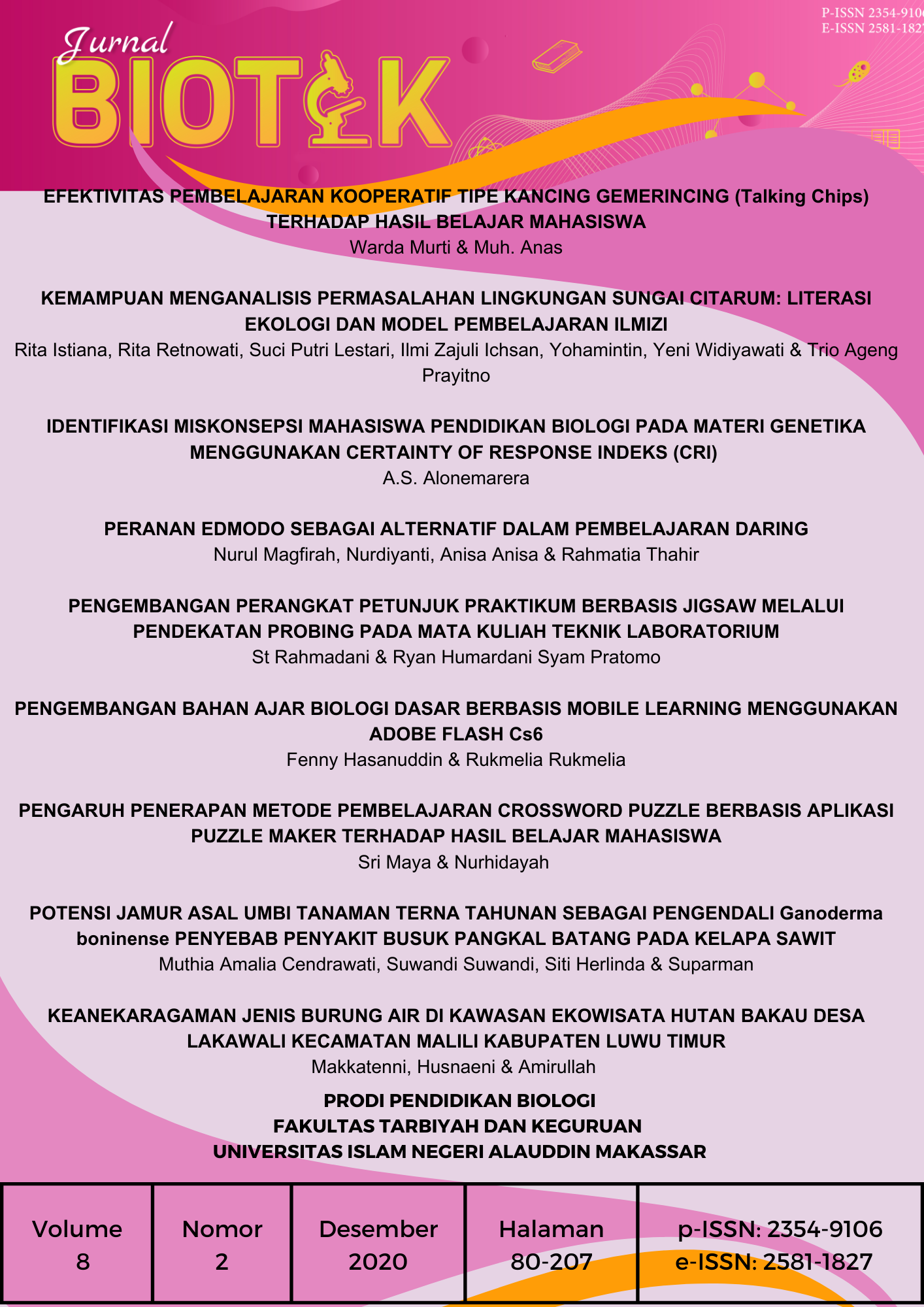PERANAN EDMODO SEBAGAI ALTERNATIF DALAM PEMBELAJARAN DARING
Abstrak
This study aims to find out the influence of learning media of E-Learning based on Edmodo toward learning outcomes of biology students at the Muhammadiyah University of Makassar. This type of research was quasi-experimental with a pretest-posttest control group design. The population of this research was all students of fourth-semester where 45 students selected as the sample. The sample consisted of 22 students in experimental group and 23 students in control group. The result showed that the Sig value was smaller than the level of significance (α). The hypothesis testing with t-test (independent-sample t-test) obtained a sig value was 0.006 with a significance level (α) was 0.0. It appears that there is an effect of E-Learning based on Edmodo toward student's learning outcomes of biology education at the University of Muhammadiyah Makassar.
##plugins.generic.usageStats.downloads##
Referensi
Al-Kathiri, F. (2015). Beyond the classroom walls: edmodo in saudi secondary school EFL instruction, Attitudes and challenges. English Language Teaching., 8(1). https://doi.org/10.5539/elt.v8n1p189
Al-Said, K. M. (2015). Students’ perceptions of Edmodo and mobile learning and their real barriers towards them. Turkish Online Journal of Educational Technology, 14(2). tojet.net/articles/v14i2/14220.pdf
Arianti, S. (2020). Pembelajaran Model E-Learning Menggunakan Aplikasi Edmodo Pada Mata Kuliah Kosmografi Mahasiswa Semester IV Program Studi Pendidikan Geografi. Jurnal Meretas. https://jurnal.upgriplk.ac.id/index.php/meretas/article/view/162
Atika, D. R., & Zafri. (2019). Kelebihan Aplikasi Edmodo Dalam Pembelajaran Sejarah Di SMA Negeri 3 Bukittinggi. Jurnal Kronologi, 1(2), 59–69. http://kronologi.ppj.unp.ac.id/index.php/jk/article/view/11/11
Balasubramanian, K., Jaykumar, V., & Fukey, L. N. (2014). A Study on “Student Preference towards the Use of Edmodo as a Learning Platform to Create Responsible Learning Environment.” Procedia - Social and Behavioral Sciences, 144, 416–422. https://doi.org/10.1016/j.sbspro.2021.11.29
Cahyono, Y. D. (2015). E-learning (Edmodo) Sebagai Media Pembelajaran Sejarah. Jurnal Penelitian. https://e-journal.usd.ac.id/index.php/JP/article/view/813
Diah, P. (2020). Penerapan E-Learning Untuk Menunjang Kegiatan Belajar Mengajar Bagi Guru Di Lingkungan Pcm Kartasura. Abdi Teknoyasa, 1(1), 13–16. http://journals2.ums.ac.id/index.php/abditeknoyasa/article/view/48/57
Gatot, P. (2013). Materi Simulasi Digital. Jakarta: Seamolech
Oktaviani, A., Siswandari, & Muchsini, B. (2019). Keefektifan Penerapan E-Learning Edmodo Untuk Meningkatkan Hasil Belajar Akuntansi Siswa. Tata Arta: Jurnal Pendidikan Akuntansi 5(2). https://jurnal.uns.ac.id/tata/article/view/39883
Ompusunggu, V. D. K., & Sari, N. (2019). Efektifitas Penggunaan E-Learning Berbasis Edmodo Terhadap Kemampuan Komunikasi Matematika. JURNAL CURERE. 3(2). https://doi.org/10.36764/jc.v3i2.250
Purnawarman, P., Susilawati, & Sundayana, W. (2016). The use of Edmodo in teaching writing in a blended learning setting. Indonesian Journal of Applied Linguistics. https://doi.org/10.17509/ijal.v5i2.1348
Rahmawati, E., Jaenudin, R., & Fitriyanti. (2015). Pengaruh Media Edmodo Terhadap Hasil Belajar Peserta Didik Pada Mata Pelajaran Ekonomi Di Sma Negeri 1 Indralaya Utara. Jurnal Profit. 2(2). https://ejournal.unsri.ac.id/index.php/jp/article/view/5563
Retnoningsih, E. (2017). Perbandingan Learning Management System Edmodo dan Moodle Dalam Pembelajaran Online. Information System For Educators And Professionals. 1 (2) http://ejournal-binainsani.ac.id/index.php/ISBI/article/view/366
Ryane, I dan El-Faddouli, N. (2020). A Case Study of Using Edmodo to Enhance Computer Science Learning for Engineering Students. International Jurnal of emerging Technolgies in Learning. 15(3). https://online-journals.org/index.php/i-jet/article/view/11252
Rohmani, E. F. dan M. (2016). Penerapan Metode E-Learning Menggunakan Edmodo Di SMK Gema Bangsa untuk Meningkatkan Mutu Pembelajaran Di Bidang IPTEK. Prosiding Temu Ilmiah Nasional Guru (TING) VIII.
Seamolec. (2013). Buku Sumber Simulasi Digital. Seamolec.
Siahaan, E. B. (2020). Students’ Perception of Edmodo use as a Learning Tool. JET (Journal of English Teaching). 6(1). http://ejournal.uki.ac.id/index.php/jet/article/view/1061
St., L. R. (2005). Helping students become autonomous learners: can technology help? Webheads in Action Online Convergence, 1–11. https://scholar.google.co.id/scholar?hl=id&as_sdt=0%2C5&q=Helping+students+become+autonomous+learners%3A+can+technology+help%3F&btnG=
Wahyu, M. I. U. (2020). Implementasi E-Learning Menggunakan Edmodo bagi Guru-Guru SD Kecamatan Cawas, Klaten. ABDIMASKU : JURNAL PENGABDIAN MASYARAKAT, 3(1), 56–64. http://abdimasku.lppm.dinus.ac.id/index.php/jurnalabdimasku/article/view/73/47
Wahyuni, S., Mujiyanto, J., Rukmini, D., Fitriati, S. W., & Handoyo, B. (2020). Integrating Edmodo into english instruction: Students’ perceptions and its contribution to autonomous learning. International Journal of Scientific and Technology Research. 9(2). http://www.ijstr.org/paper-references.php?ref=IJSTR-0120-29375
Widiyasari, R. (2017). Meningkatkan Aktivitas dan Hasil Belajar Mahasiswa Menggunakan Mind Map Berbantuan E - Learning Increasing Students ’ Learning Activity. Jurnal Teknodik. 21 (1). http://dx.doi.org/10.32550/teknodik.v21i1.270
Wijaya, I., & Arsyah, R. H. (2015). Pengaruh Pembelajaran E-Learning Berbasis Edmodo terhadap Hasil Belajar Simulasi Digital Kelas X SMK Negeri 9 Padang (Studi Kasus Jurusan Akomodasi Perhotelan). Majalah Ilmiah UPI YPTK. 22(1). http://lppm.upiyptk.ac.id/majalahilmiah/index.php/majalahilmiah/article/view/61
Zamrotul, A., & Durinta, P. (2015). Penggunaan Edmodo Sebagai Media Pembelajaran E-Learning Pada Mata Pelajaran Otomatisasi Perkantoran Di SMKN 1 Surabaya. Jurnal Pendidikan Administrasi Perkantoran (JPAP), 3(3), 1–13. https://jurnalmahasiswa.unesa.ac.id/index.php/jpap/article/view/12541
Authors who publish with Jurnal Biotek agree to the following terms: Authors retain the copyright and grant Universitas Islam Negeri Alauddin Makassar right of first publication with the work simultaneously licensed under a Creative Commons Attribution License (CC BY-SA 4.0) that allows others to share (copy and redistribute the material in any medium or format) and adapt (remix, transform, and build upon the material) the work for any purpose, even commercially with an acknowledgement of the work's authorship and initial publication in Universitas Islam Negeri Alauddin Makassar. Authors are able to enter into separate, additional contractual arrangements for the non-exclusive distribution of the journal's published version of the work (e.g., post it to an institutional repository or publish it in a book), with an acknowledgement of its initial publication in Universitas Islam Negeri Alauddin Makassar. Authors are permitted and encouraged to post their work online (e.g., in institutional repositories or on their website) prior to and during the submission process, as it can lead to productive exchanges, as well as earlier and greater citation of published work (See The Effect of Open Access).

This work is licensed under a Creative Commons Attribution-ShareAlike 4.0 International License.



